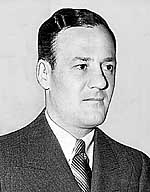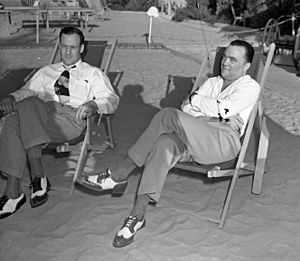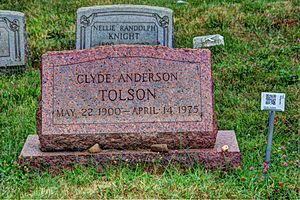Clyde Tolson facts for kids
Quick facts for kids
Clyde Tolson
|
|
|---|---|
 |
|
| 1st Associate Director of the Federal Bureau of Investigation | |
| In office 1930 – May 3, 1972 |
|
| President | |
| Preceded by | Position established |
| Succeeded by | Mark Felt |
| Acting Director of the Federal Bureau of Investigation | |
| In office May 2, 1972 – May 3, 1972 |
|
| President | Richard Nixon |
| Preceded by | J. Edgar Hoover |
| Succeeded by | L. Patrick Gray (acting) |
| Personal details | |
| Born |
Clyde Anderson Tolson
May 22, 1900 Laredo, Missouri, U.S. |
| Died | April 14, 1975 (aged 74) Washington, D.C., U.S. |
| Education | George Washington University (BA, LLB) |
| Awards | |
Clyde Anderson Tolson (born May 22, 1900 – died April 14, 1975) was a very important official at the FBI. From 1930 until 1972, he was the second-highest person in charge. After 1947, his title was Associate Director. He was mainly in charge of FBI staff and making sure rules were followed. He was a close helper and friend to the famous FBI Director J. Edgar Hoover for many years.
Contents
Early Life and Education
Clyde Tolson was born in Laredo, Missouri. His father, James William Tolson, was a farmer and worked for the railroad. His mother was Joaquin Miller Tolson. Clyde had a brother named Hillory Alfred Tolson. Hillory also worked for the FBI before joining the National Park Service.
Clyde finished high school in Laredo in 1915. He then went to Cedar Rapids Business College and graduated in 1918. He later earned two degrees from George Washington University. He got a Bachelor of Arts degree in 1925. Then, he earned a Bachelor of Laws degree in 1927.
Early Career Steps
Before joining the FBI, Tolson worked for the government. From 1919 to 1928, he was a private secretary. He worked for three different Secretaries of War. These leaders were Newton D. Baker, John W. Weeks, and Dwight F. Davis.
Working at the FBI
In 1928, Clyde Tolson applied to work for the FBI. He was hired as a special agent that same year. He hoped this job would help him gain experience. He also wanted to save money to open his own law office.
Tolson first worked in the FBI offices in Boston and Washington, D.C.. By 1930, he became the main FBI clerk. Soon after, he was promoted to assistant director.
He was involved in some exciting events. In 1936, he helped J. Edgar Hoover arrest a bank robber named Alvin Karpis. Later that year, he was in a gunfight with a gangster named Harry Brunette. He survived this dangerous event. In 1942, Tolson helped capture Nazi spies. These spies had landed on Long Island and in Florida.
In 1947, Tolson became the FBI's Associate Director. In this role, he managed the FBI's budget and daily operations.
Close Relationship with J. Edgar Hoover

Clyde Tolson and J. Edgar Hoover were very close friends and colleagues. They worked together for many years. They often rode to and from work together. They also ate lunch together almost every day. They frequently traveled together for work or for fun.
When Hoover passed away in 1972, Tolson received his belongings. Tolson moved into Hoover's house. He also accepted the U.S. flag that was placed on Hoover's coffin. This showed how important their friendship was.
Later Years and Retirement
In 1965, President Lyndon B. Johnson gave Tolson a special award. It was called the President's Award for Distinguished Federal Civilian Service. The President praised Tolson for improving law enforcement. He said Tolson helped the FBI reach "new heights of accomplishment."
J. Edgar Hoover kept Tolson working at the FBI. This was true even after Tolson was old enough to retire. After Hoover died on May 2, 1972, Tolson briefly became the acting head of the FBI. However, he soon retired due to his own health issues. This was on May 4, the day of Hoover's funeral. Mark Felt then took over Tolson's position.
After leaving the FBI, Tolson's health got worse. He had a stroke in 1975. On April 10, 1975, he went to the hospital for kidney failure. He died four days later from heart failure. Clyde Tolson was 74 years old. He is buried in the Congressional Cemetery in Washington D.C., near Hoover's grave.
Clyde Tolson in Movies and Books
Clyde Tolson has been shown in many stories. These include novels, TV shows, and movies. Here are some examples:
- The 1977 film The Private Files of J. Edgar Hoover
- The 1984 TV movie Concealed Enemies
- The 1987 TV movie J. Edgar Hoover
- The 1992 TV movie Citizen Cohn
- The 1995 film Nixon
- The 1997 novel Underworld by Don DeLillo
- The 2011 film J. Edgar
- The 2013 TV movie The Curse of Edgar
- The 2015 comic Providence by Alan Moore
See also
 In Spanish: Clyde Tolson para niños
In Spanish: Clyde Tolson para niños
 | Janet Taylor Pickett |
 | Synthia Saint James |
 | Howardena Pindell |
 | Faith Ringgold |


